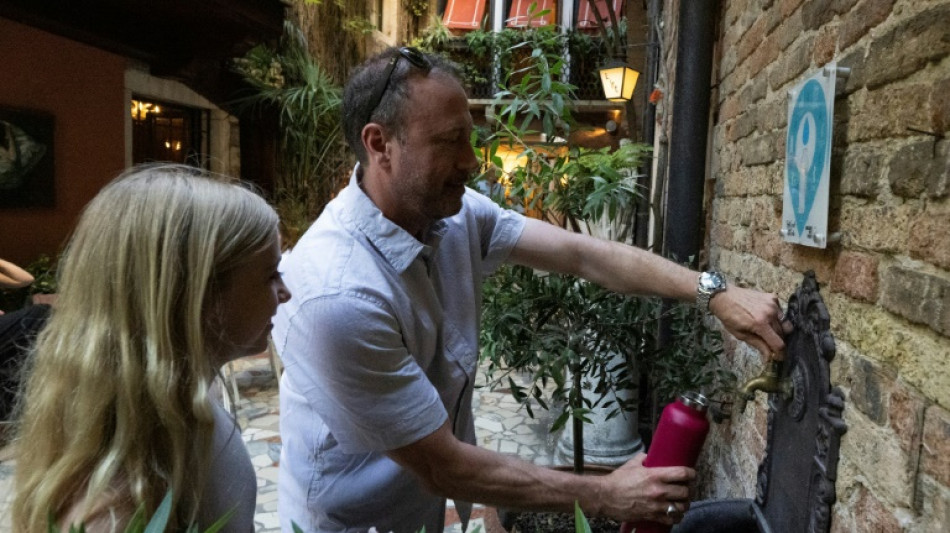

Venice pushes tourists to drink from fountains and shun plastic
A few steps from Venice's St. Mark's Square, a little girl fills her water bottle at a courtyard fountain, a haven of peace far from the hordes of tourists.
"Plastic bottles are super annoying to me," said 11-year-old Keira from Tucson, Arizona. "There is so much plastic in the ocean and everywhere."
Her father, Charlie Michieli, also believes in swapping plastic for refillable bottles: "You can go through quite a lot, especially on a long trip... litres and litres and litres of plastic bottles."
In Venice, which welcomes millions of visitors each year, tourism contributes to between 28 and 40 percent of garbage production depending on the season, according to local government data -- including piles and piles of plastic water bottles.
To combat the waste, local authorities now promote the use of refillable water bottles by calling tourists' attention to the vast network of drinking water fountains dotting the squares and alleys of the watery city.
"In the historic centre, there are 126 fountains spread over the area, they're easy to find, there's one nearly every 100 metres (330 feet)," said architect Alberto Chinellato in his city hall office overlooking the Rialto Bridge.
To make things even easier, water distribution company Veritas has launched an app showing a map with all the nearest fountains.
"Encouraging the use of free drinking water certainly produces less waste... but also brings fewer bottles in the historic centre, which means less pollution and less transport", said Chinellato.
Leaving Chinellato's office, AFP observed an empty plastic water bottle bobbing between two gondolas on the Grand Canal -- underscoring that the battle against plastic is far from being won.
- Little blue drop -
At the centrally located Hotel Flora, owner Gioele Romanelli has also decided to contribute to the crusade against plastic by educating his guests.
"We simply had a card printed on which we pointed out the fountains of Venice with a little blue drop," said Romanelli, proudly displaying a copy on a small bistro table.
"Not only with a refillable bottle, but also by recycling a small (plastic) water bottle you can keep all day," said the 49-year-old hotelier.
At check-in, guests are briefed about Venice's "good water".
"They are sometimes surprised to learn that the water in Venice is drinkable," he said.
"With this small gesture, our customers can actively participate in the battle against plastic," he said, seeing it as a way, in a city with "an insane number of tourists", to give them a certain sense of responsibility.
In addition to the card marking the city's fountains, the hotel has done away with single-dose shampoo and shower gel bottles in the rooms in favour of refillable dispensers.
At breakfast, plastic is something of the past, with the hotel now using small glass containers for muesli, dried fruit and yogurt, Romanelli said.
Venice is quickly recovering its tourist traffic following the coronavirus pandemic that robbed it of its economic lifeline.
But after reaching a total of 5.5 million visitors in 2019 -- eclipsing the city centre's 50,000 inhabitants -- officials are trying to limit arrivals.
From January, day visitors will pay a tax they've been able to avoid until now by not staying overnight.
The tax, priced between 3-10 euros (around $3-$10) depending on the number of crowds, will be payable online on a dedicated website.
It will provide visitors with a QR code needed for entry at the various entry points to the historic centre.
R.Abate--IM




